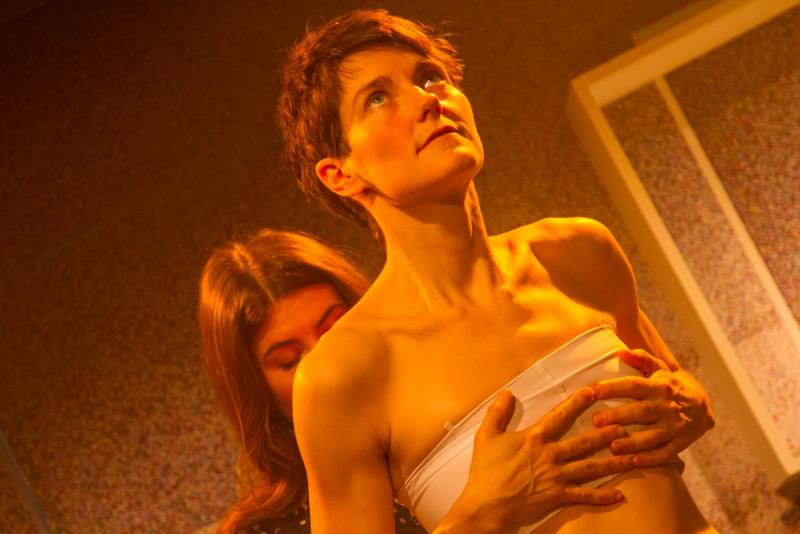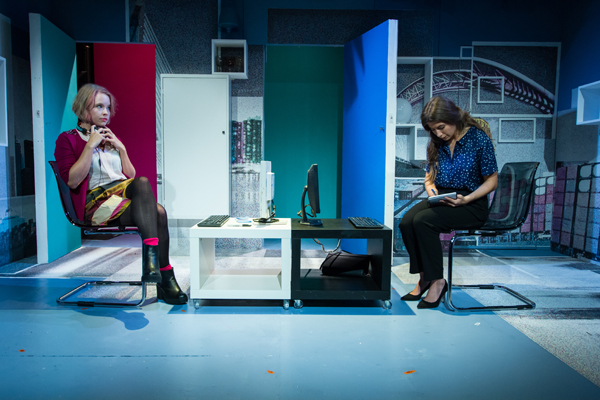Rotterdam, Trafalgar Studios | reviews, news & interviews
Rotterdam, Trafalgar Studios
Rotterdam, Trafalgar Studios
New drama about a transgender lesbian is hugely enjoyable

How many genders are there? The simplistic answer is two, but if you really think that then it’s time to go to the back of the class. In recent years, the rapid growth in perception of the fluidity of gender identity has meant that although there has been an increase in transgender stories in the news, culture has lagged a bit behind. Now every art form wants its own Danish Girl.
First staged at Theatre 503 last year, the play begins on New Year’s Eve in the Dutch city of its title. British twentysomething Alice has decided to tell her parents, who live in the UK, that she’s a lesbian – and is just about to email them. But before she does so, her lover Fiona tells her that she/he has always identified as being a man. In fact, he now wants to start living as a bloke called Adrian. So Alice faces the first of several gender-bending questions, including ones about her own identity: if your lesbian lover becomes a man, what does that say about you? Does it mean that you’re straight? And have you really been straight all along?
The show is smart, sharp and emotionally moving
In the next few scenes, Brittain complicates this situation by adding Josh, a thirtysomething Briton who is the former lover of one of the couple, and the Dutch youngster Lelani, a work colleague. Compared to the rather repressed Brits, Lelani is a wonderfully conceived character, provocative, outspoken and truth-telling. And a lot of fun. In the pre-show warm-up her dancing tells you that she’s gonna rock. And she does. The various complex relationships between the characters create a satisfyingly tangled situation, which is brilliantly and humorously observed, and told in a well-structured and exciting way. With its thumping soundtrack, and Ellan Parry’s versatile and modernistic set, the evening takes off on a fine mix of laughter and thought-provoking issues.
It has to be said that when Brittain writes about sibling rivalry and couple relationships, he is more convincing than when he describes the feelings of Fiona/Adrian, where the writing occasionally feels more like research than genuinely imagined personal experience. But does this matter? Not a bit! It doesn’t really affect the enjoyable nature of this show, which is smart, sharp and emotionally moving. So much so that when Adrian finally says, “I don’t want to change the world, I just want people to see me the way I want to be seen,” you feel like punching the air. Setting the story in the Dutch port city enables Brittain to introduce the theme of homesickness and distance, and to bring up questions of how personal identity relates to national identity. As the cultural differences accumulate, the famous politeness of the English begins to appear increasingly like moral cowardice and even like covert violence. Passive aggression indeed. In this story of the disruptive power of desire, relationships are seen as based on secrets and lies, which gradually are blown away by the hot breath of truth. And the truth is often told best by outsiders. With enormous energy, Donnacadh O’Briain’s pacy production takes the evening by storm, allowing its cast of four plenty of room to breathe and change.
Setting the story in the Dutch port city enables Brittain to introduce the theme of homesickness and distance, and to bring up questions of how personal identity relates to national identity. As the cultural differences accumulate, the famous politeness of the English begins to appear increasingly like moral cowardice and even like covert violence. Passive aggression indeed. In this story of the disruptive power of desire, relationships are seen as based on secrets and lies, which gradually are blown away by the hot breath of truth. And the truth is often told best by outsiders. With enormous energy, Donnacadh O’Briain’s pacy production takes the evening by storm, allowing its cast of four plenty of room to breathe and change.
Anna Martine and Alice McCarthy are both outstanding as the sharply contrasting Fiona/Adrian and Alice, being convincing in their confusion, their joy and their despair. They feel real and very much alive. In support Ed Eales-White as the slightly underwritten Josh and Jessica Clark (pictured above with McCarthy) as the magical leftfielder Lelani are likewise equally watchable. All four convey both the hilarity and the emotional truth of this occasionally painful, but fundamentally heartfelt and good-natured play.
rating
Share this article
The future of Arts Journalism
You can stop theartsdesk.com closing!
We urgently need financing to survive. Our fundraising drive has thus far raised £49,000 but we need to reach £100,000 or we will be forced to close. Please contribute here: https://gofund.me/c3f6033d
And if you can forward this information to anyone who might assist, we’d be grateful.

Subscribe to theartsdesk.com
Thank you for continuing to read our work on theartsdesk.com. For unlimited access to every article in its entirety, including our archive of more than 15,000 pieces, we're asking for £5 per month or £40 per year. We feel it's a very good deal, and hope you do too.
To take a subscription now simply click here.
And if you're looking for that extra gift for a friend or family member, why not treat them to a theartsdesk.com gift subscription?
more Theatre
 Hedda, Orange Tree Theatre review - a monument reimagined, perhaps even improved
Scandinavian masterpiece transplanted into a London reeling from the ravages of war
Hedda, Orange Tree Theatre review - a monument reimagined, perhaps even improved
Scandinavian masterpiece transplanted into a London reeling from the ravages of war
 The Assembled Parties, Hampstead review - a rarity, a well-made play delivered straight
Witty but poignant tribute to the strength of family ties as all around disintegrates
The Assembled Parties, Hampstead review - a rarity, a well-made play delivered straight
Witty but poignant tribute to the strength of family ties as all around disintegrates
 Mary Page Marlowe, Old Vic review - a starry portrait of a splintered life
Tracy Letts's Off Broadway play makes a shimmeringly powerful London debut
Mary Page Marlowe, Old Vic review - a starry portrait of a splintered life
Tracy Letts's Off Broadway play makes a shimmeringly powerful London debut
 Little Brother, Soho Theatre review - light, bright but emotionally true
This Verity Bargate Award-winning dramedy is entertaining as well as thought provoking
Little Brother, Soho Theatre review - light, bright but emotionally true
This Verity Bargate Award-winning dramedy is entertaining as well as thought provoking
 The Unbelievers, Royal Court Theatre - grimly compelling, powerfully performed
Nick Payne's new play is amongst his best
The Unbelievers, Royal Court Theatre - grimly compelling, powerfully performed
Nick Payne's new play is amongst his best
 The Maids, Donmar Warehouse review - vibrant cast lost in a spectacular-looking fever dream
Kip Williams revises Genet, with little gained in the update except eye-popping visuals
The Maids, Donmar Warehouse review - vibrant cast lost in a spectacular-looking fever dream
Kip Williams revises Genet, with little gained in the update except eye-popping visuals
 Ragdoll, Jermyn Street Theatre review - compelling and emotionally truthful
Katherine Moar returns with a Patty Hearst-inspired follow up to her debut hit 'Farm Hall'
Ragdoll, Jermyn Street Theatre review - compelling and emotionally truthful
Katherine Moar returns with a Patty Hearst-inspired follow up to her debut hit 'Farm Hall'
 Troilus and Cressida, Globe Theatre review - a 'problem play' with added problems
Raucous and carnivalesque, but also ugly and incomprehensible
Troilus and Cressida, Globe Theatre review - a 'problem play' with added problems
Raucous and carnivalesque, but also ugly and incomprehensible
 Clarkston, Trafalgar Theatre review - two lads on a road to nowhere
Netflix star, Joe Locke, is the selling point of a production that needs one
Clarkston, Trafalgar Theatre review - two lads on a road to nowhere
Netflix star, Joe Locke, is the selling point of a production that needs one
 Ghost Stories, Peacock Theatre review - spirited staging but short on scares
Impressive spectacle saves an ageing show in an unsuitable venue
Ghost Stories, Peacock Theatre review - spirited staging but short on scares
Impressive spectacle saves an ageing show in an unsuitable venue
 Hamlet, National Theatre review - turning tragedy to comedy is no joke
Hiran Abeyeskera’s childlike prince falls flat in a mixed production
Hamlet, National Theatre review - turning tragedy to comedy is no joke
Hiran Abeyeskera’s childlike prince falls flat in a mixed production
 Rohtko, Barbican review - postmodern meditation on fake and authentic art is less than the sum of its parts
Łukasz Twarkowski's production dazzles without illuminating
Rohtko, Barbican review - postmodern meditation on fake and authentic art is less than the sum of its parts
Łukasz Twarkowski's production dazzles without illuminating

Add comment